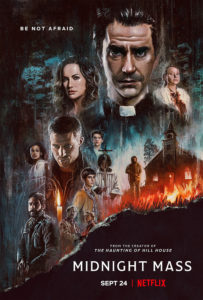Review: Midnight Mass’ Humanistic Take on Horror

WARNING! This story contains major spoilers for the Netflix series Midnight Mass.
Netflix’s chilling new series, Midnight Mass, from the creator of The Haunting of Hill House, is a different kind of horror story. The show takes place in a struggling and isolated fishing community called Crockett Island and centers on the miraculous events that transpire after an enigmatic and charismatic young priest arrives to lead the town’s church. What makes Midnight Mass unique is that it’s not your typical horror story with bountiful jump scares and sordid gore, but rather a long meditation on religion, forgiveness, community, addiction, death, and ignorance.
Midnight Mass is an incredibly personal work for the series’ creator, Mike Flanagan. He told the New York Times that the story is based on his own experience being raised Catholic and his reckoning with the darker aspects of the Bible. This ultimately led him to atheism and science, “I had more of a spiritual reaction from reading Pale Blue Dot than I ever had reading the Bible.” The series offers serious critiques of the Catholic Church and religion, without being wholly anti-religious. It contemplates how fundamentalist thinking can corrupt any belief system, and how faith can be weaponized against the faithful and the innocent bystanders in its path.
The true plot of the show isn’t revealed until episode three, [MAJOR SPOILERS AHEAD] where we learn that the young priest, Father Paul, is actually the island’s elderly Monsignor Pruitt, who had fallen ill after a pilgrimage to Damascus. While he was abroad, Monsignor Pruitt encountered a monster who drank Pruitt’s blood and then fed its own blood to him, making him young and healthy. The priest surmises that he met an angel of god that performed a miracle on him and that it is his duty to bring the angel back to his town to revitalize it. And so Father Paul does just that, spiking the sacramental wine at each Mass with the blood of the angel which heals the ailments and reverses the aging process of all who drink it. As the news of these miracles spread, attendance at mass increases, giving hope to the unsuspecting people of Crockett Island. Eventually, the true horror of the situation is revealed to the townspeople and the “good” parishioners are reborn with a thirst for blood, while those who refused Communion are left to be consumed as food.
What’s obvious to viewers―that Father Paul and his angel are vampires―is not so obvious to Father Paul himself and the townspeople of Crockett Island. Intriguingly, no one in the course of the show ever says the word “vampire.” So, as viewers, there are even times when we fall into the trap and question whether the monster actually is an angel. After all, it isn’t completely out of bounds for Catholicism’s themes of death, rebirth, eternal life, and blood drinking.
This point is repeatedly reinforced by Bev Keane, chief antagonist and a vicious, fanatical follower of the Church, who produces scripture to usher in the book of Revelations and justify every monstrosity, such as, “Whoever eats my flesh and drinks my blood has eternal life. And I will raise them up on the last day, for my flesh is real food, and my blood is real drink and whoever eats my flesh and drinks my blood will remain in me, and I in them.” Bev also quotes Deuteronomy to incite fear of skepticism and retaliation: “The man who acts presumptuously by not obeying the priest who stands to minister there before the Lord, your God…that man shall die.”
Midnight Mass is full of these references to the Bible. In an interview with The Wrap, Flannigan said, “And so, yes, there was very fertile ground in the biblical text to kind of create, or at least justify, a lot of the things the story is doing through actual biblical descriptions of angelic properties and actions… And that’s one of the fascinating things about the Bible, there’s a lot of horror in it.”
The show demonstrates just how close otherwise ordinary priests and worshipers are to extreme horrors. How easy it is for one person in authority to misinterpret or bend text to suit their agenda, no matter how well-intentioned they may be. And how susceptible we are to hearing what we want to hear, especially when desperation makes us vulnerable.
There are many other themes that the show explores that would be interesting to humanists. In addition to numerous philosophical monologues on death and dying, several of the show’s characters truly stand out. Riley Flynn, an atheist, suffers from addiction and the role religion plays in his recovery with Alcoholics Anonymous. Sarah Gunning, the town’s doctor, struggles to reconcile her patients’ dedication to Catholicism with her career in science and her LGBTQ+ identity. Erin Greene, a survivor of domestic abuse, overcomes her trauma to find unbelievable strength and self-worth. Sheriff Hassan faces constant racism and denigration from the residents of Crockett Island for practicing Islam and is swiftly shut down when he raises concerns about the Bible being taught in public school, among many other things.
The beauty of Midnight Mass is that it’s these characters who make the “ultimate sacrifice” to save the world. They are the true heroes in the end.
Midnight Mass certainly is a wake-up call and a critique for those who need to reckon with the complicity of their traditions. But ultimately, Flanagan’s story isn’t anti-religious, it’s pro-human. In the end, it’s about decency, being a good person, and having faith in humanity. After being reborn into vampires, Riley’s parents, Ed and Annie, realize that they have control over their new bloodthirst and can resist it, affirming, “Whatever this is, it doesn’t change who you are.” Whatever you may believe or struggle with, don’t lose sight of yourself and the goodness within you.
